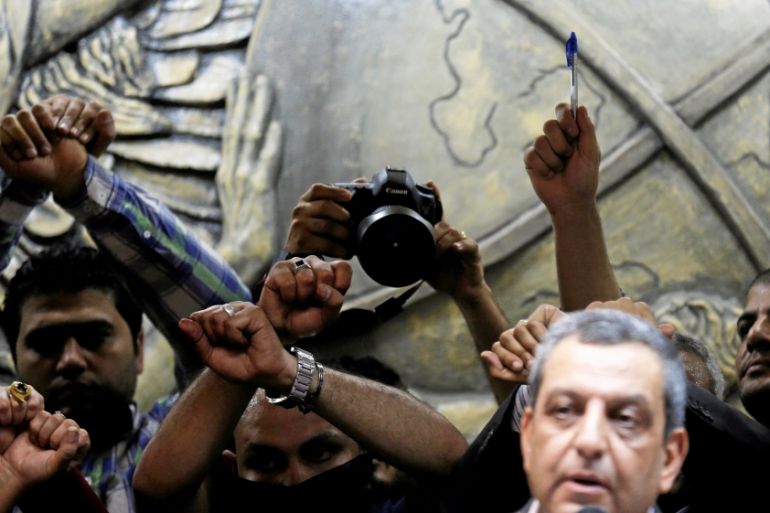UN condemns Egypt’s widening ‘assault on free speech’
Rights experts say Egypt’s blocking of some 130 websites looks ‘more like repression than counter-terrorism’.

UN human rights experts have raised “grave concern” over a widening “assault on freedom of expression” in Egypt, condemning the blocking of scores of news websites and the unlawful detention of journalists.
Some 130 websites may have been banned by the Egyptian government on allegations of “supporting terrorism” and “spreading lies”, David Kaye and Fionnuala Ni Aloain said in a statement on Wednesday.
Keep reading
list of 4 itemsGeorgia advances ‘foreign agents’ bill as 20,000 rally against it
Lawmakers brawl as Georgian Parliament considers ‘foreign agent’ bill
Journalist loses foot after being badly wounded in Israeli attack in Gaza
The blocking appears to be based on “overbroad counter-terrorism legislation” and a lack of any form of transparency, the UN’s rapporteurs said, adding that most of the websites were banned without warning.
“Limiting information as the Egyptian government has done, without any transparency or identification of the asserted ‘lies’ or ‘terrorism’, looks more like repression than counter-terrorism,” they said.
READ MORE: Al Jazeera slams Egypt’s treatment of Mahmoud Hussein
The sites shut down or blocked in Egypt include that of news organisations, such as Al Jazeera, Mada Masr and Al Watan, as well as the websites of human rights groups, including Reporters Without Borders (RSF) and the Arabic Network for Human Rights Information.
|
|
The latest crackdown began in late May when authorities blocked access to 21 websites. At the time, anonymous security sources told local media that all the banned sites contain material that “support terrorism and extremism as well as publish lies”.
Some financial newspapers have also been banned, including Al-Borsa, which generally avoids politics and reflects the views of a largely pro-state business community.
Kaye, the special rapporteur on freedom of expression, and Aloain, the special rapporteur on human rights and counter-terrorism, said the situation of journalism, freedom of expression, and access to information in Egypt has been in crisis for many years.
“It takes many forms, including the unlawful detention and harassment of journalists and activists,” they said, urging the government to release all detained journalists.
Al Jazeera’s Mahmoud Hussein is one of many journalists imprisoned in Egypt. He has been detained without charge since December 2016.
Hussein has repeatedly complained of suffering mistreatment in prison and denial of legal rights.
Earlier this month, RSF, a global press freedom group which describes Egypt as one of the world’s biggest prisons for journalists, said it was yet to obtain an explanation for the reason behind the blocking of its website.
Several outlets, including Masr Al Arabia and Mada Masr, have also submitted requests to government ministries and media regulators asking for a reason, but have had no success, RSF said.
Censored online media are trying to keep their content available to Egyptian readers via VPNs, a software that enables users to bypass blocking by masking their IP address and appearing not to be in Egypt.
However, the Association for Freedom of Thought and Expression (AFTE), an Egyptian NGO, said on Tuesday that 261 websites providing VPN services were now inaccessible in the country.
Last week, the United States informed Egypt it would withhold $290m in official assistance because of its failure to make progress on respecting human rights.